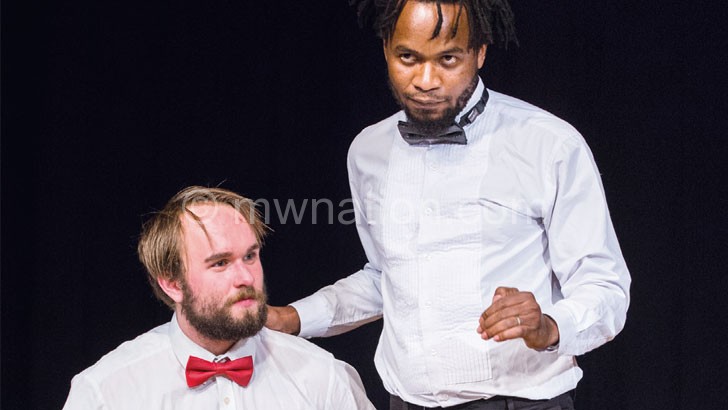Malawian conquers the world with theatre
Thokozani Kapiri (TK), a Malawian artist studying in Switzerland, is making strides in theatre on the global stage. He is touring Africa, United States (US) and Europe with plays he collaborated with theatre artists from German-speaking countries of Switzerland, Germany, Austria and Lichtenstein. JOHN CHIRWA (JC) caught up with him.
JC: May you give us the background to this tour. What is this play and what role are you playing?
TK: Well, I have been in Zurich, Switzerland, for the past two years, studying theatre and film directing towards a master’s degree at the University of Zurich. As such, collaborating and touring with theatre artists from German-speaking countries of Switzerland, Germany, Austria and Lichtenstein has been a regular feature in my work considering that I have added German language to my work in arts.
My most recent production was Dreams and Hopes. It involves a Malawian actor in myself, Dan Finn from US and Jördis, an actress from Germany. The play interrogates personal dreams against realities that we get about each other’s continents, in this case Africa, America and Europe. We premiered it in Zürich last June, but we hope to tour Detroit-Michigan in the US, Toronto in Canada and Malawi next year.
In brief, over my two-and-half years in Switzerland, I have been involved in several projects that got me crossing borders beyond Europe, even as far as China, Israel and Palestine. It has been a pleasure to do devised work together, sometimes directing German classical scripts in State theatres. I finished working on a German play, Judith, by Friedrich Hebbels last February in Theatre Konstanz.

The whole cast was by German actors and I directed it. We managed to bring in issues of terror and media coverage to this old script and the reviews were quite positive. There have been African scripts that I have introduced in Zurich too. I can mention Anthol Fugard’s Blood Knot and Master Harold and The Boys as texts that I have directed there lately. Both plays confront issues of race in Europe and beyond today in my adaptations even though the originals focus on historical apartheid context of South Africa. We are scheduled to tour Lichtenstein with these plays in January next year. Two German actors and I play again under my direction. We hope to bring both plays as well to tour Malawi next year.
JC: What lessons have you drawn from your experience touring with these actors? What comparisons and contrasts do you draw with Malawi?
TK: The experiences I am drawing in Switzerland are priceless. One thing about the theatre scene in Germany, Switzerland and Austria is the dedication and attention to detail. Nothing is taken for granted as we do sometimes in Malawi where mostly we rush into showcasing half-baked material. In Europe, for the theatre to rehearse means hours and hours of work and time is of the essence.
There is also a lot of experimentation with aesthetic methods such as post-dramatic theatre which challenges the conventional stage theatre texts. They are deconstructing written texts and making them relevant to their media-saturated world today.
Again, like any other job, theatre is funded by the governments and corporations and taken seriously. It is an industry even at theatre level. We can create that here and run art as a business.
JC: How do you think we can move Malawian theatre forward?
TK: With belief and dedication. Malawi remains an opportunity for the budding artist. We can envision a scene where the theatre artist can live by his own theatre and not operate only as part time. But the work improves in quality. That demands time and detailed work. The theatre artist cannot blame the audience for not coming. Our work must speak for itself and attract attention.
JC: What problems do you see hindering Malawian theatre and its progress?
TK: The main challenge with theatre in Malawi remains funding and infrastructures. The aesthetic gap in terms of training and innovation must also be filled. We cannot keep being theatre copycats of what others have done before or are doing in other countries or overseas. There are no shortcuts to a good theatre piece. Without space and money, we can still dedicate time and energy to produce some good, relevant plays that appeal to the audience in a critical and original aesthetic way. I am sure the audience will start to gradually pay attention. Let the theatre art speak. More work, less whining is the artistic motto. In this social media age, advertising for a show has become much more affordable and accessible. There is no good excuse on our part.
JC: Going forward, do you harbour plans of turning this stage experience into television?
TK: I do hope my stage work will eventually evolve into film and television in Malawi. But there is no jumping the gun. I directed and produced just one short film This is not Lampedusa in the two years so far in Switzerland. It involved a lot. It took one year to organise and one year to shoot and edit. We may aspire to move fast into TV spaces that have been opened, but I would emphasise quality over quantity. Definitely, soon I hope to collaborate with the European film artists for projects targeting Africa, Europe and beyond in the same way I am doing with the stage theatre scene.





